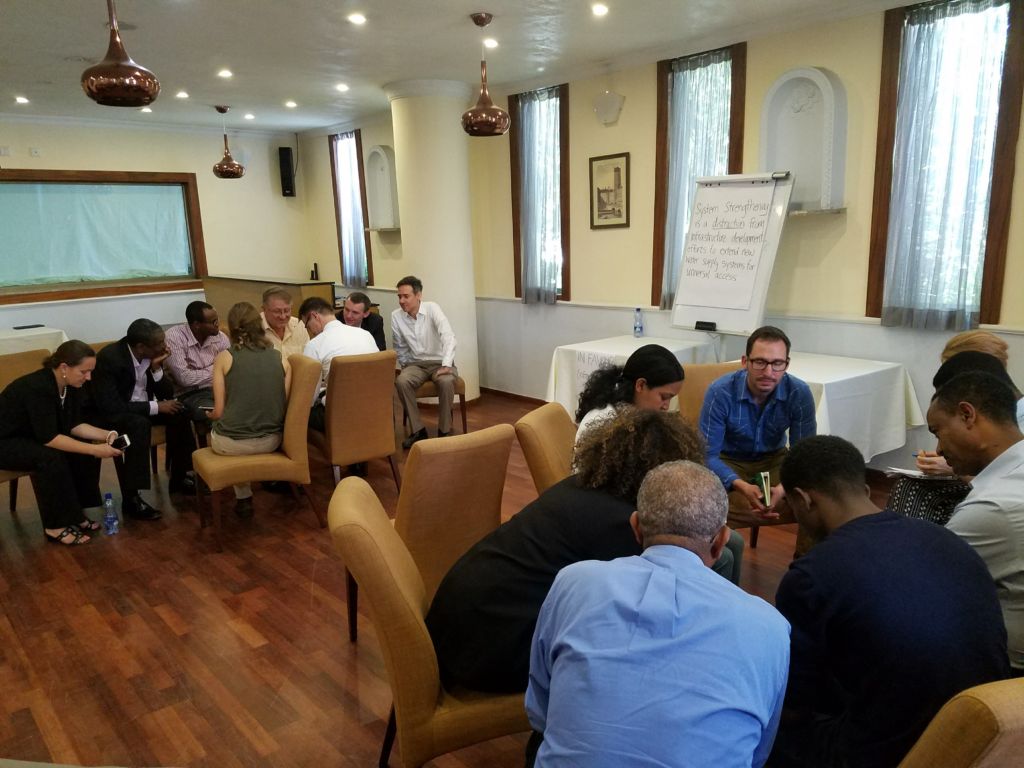All of us who work on understanding and implementing development from a systems perspective can rattle off a litany of arguments as to why traditional approaches don’t work: linear results chains don’t reflect reality. People and their motivations and power dynamics matter. Unanticipated feedback loops can scuttle the best-planned activities. The list goes on, filled with jargon-laden concepts like “emergence,” “causal loops,” “dynamic modeling,” and “complex adaptation.”
In the Sustainable WASH Systems Initiative (SWS), we are taking a systems approach in communities with dire water and sanitation needs, and so we frequently make these sorts of arguments. But as we move ahead with our approach, it’s important to ask ourselves: Do all of these systems concepts really add up to anything useful? After all, we can create all the pretty water systems maps in the world, but as far as I know you can’t drink a causal loop diagram, and it’s hard to dig a well with a network analysis report. Might it be better to move all our resources away from systems analyses and approaches, and into more direct WASH infrastructure development?
To confront this possibility, the SWS team in Ethiopia, led by IRC with partners UC Boulder, Tetra Tech, and LINC, convened a debate on the appropriateness of systems approaches for the WASH Sector in that country. The SWS Initiative is currently kicking off a series of WASH systems interventions in four woredas around the country, so we thought that an honest debate with other organizations in the WASH sector could help ensure that we fully understand and acknowledge the potential downsides of a systems approach.
The SWS team was joined for the debate by representatives from WaterAID, AECOM (as part of the USAID-funded Lowlands WASH activity), and SPLASH. Rather than having one person fully represent each side of the debate (the “pro systems approaches” side and the “pro infrastructure approaches” side), participants split into debate teams, and the ensuing lively and passionate conversation highlighted some critical points to consider as we (and others) move forward with systems-focused interventions:
1. It’s important to communicate the impact of systems approaches in a non-academic and locally relevant way. If the electricity is out at my house, and the first person who shows up tells me that they’re going to map my neighborhood’s relational dynamics rather than fix the transformer, I’d be pretty dubious. We should expect the same degree of reasonable skepticism from communities facing severe WASH infrastructure shortages when we conduct our systems analyses and interventions. To address this skepticism, we need to translate our academic and abstract concepts into tangible, locally-contextualized, and specific descriptions of how our work will actually lead to improving their access to water and sanitation.
2. We need to keep in mind costs, and take a systems view of the value of our own work. Systems approaches can often seem extremely expensive relative to more direct models such as infrastructure development. Extensive up-front analyses use up valuable time and money, especially when compared with the lack of concrete short-term “hard” results that donors like to tout. Although these analyses are critical to understanding the complex interactions that will lead to results down the line, it’s important to be regularly reflecting on whether and how the various analytical results end up actually being used, and think of our own analysis as a kind of “knowledge system” in which we identify the most cost-effective leverage points over time and adjust our approach accordingly.
3. Going deep in one geographic area requires careful thinking about equity. The comprehensive nature of systems approaches often means that a wide range of activities will focus on one sub-national geographic area. All development work involves hard choices about distribution, but the deep and concentrated nature of systems interventions requires particularly careful consideration as to why and how specific communities are being targeted, and how other communities can attain the same benefits over time.
4. Infrastructure-based and systems-based approaches can work together effectively if we don’t get too hung up on labels. Even the most ardent systems enthusiast would never argue that WASH infrastructure is unimportant, and likewise no infrastructure developer would advocate completely ignoring the many factors affecting long-term functionality. There are real differences in taking an infrastructure-led approach and a systems approach in terms of how activities are planned and carried out; however, differences in terminology and labels can often mask significant opportunities for productive collaboration. After all, at the end of the day we’re all working for the same thing.

IRC’s Desta Dimtse examines a failed pipe scheme with local community members in South Ari Woreda, Ethiopia.

The Sustainable WASH Systems Initiative team leads a debate on systems approaches to WASH in Addis Ababa.
